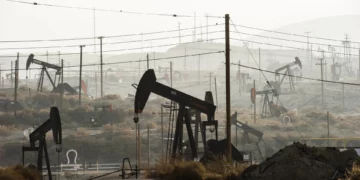Germany’s Alternative To Expensive Natural Gas
“The demand for district heating is exploding,” says Raymond Decorvet, a business development executive at MAN Energy, Germany.
The Augsburg-based energy machine manufacturer operates one of the largest heating pumps in the world. The heat pumps can heat up an Olympic-sized swimming pool carrying 2.5 million litres of water from 20C to a boiling point in just less than 4 hours. They can even freeze the whole pool in under 11 hours.
The functionality of Heat Pumps
Heat pumps work similarly to refrigerators or air conditioners- cool the incoming air using a compressor. It derives heat from nearby sources like air and water and then transfers them to wherever it is required. In this case, they compress warm refrigerants to increase the temperature of these fluids, which can be further passed on to heating households or industrial machinery.
Heat pumps are highly economical; they need electricity to run but are equipped to generate 3-4 kilowatts of heat for each kilowatt they consume. Some design alterations can even provide cooling features.
Exploding demand and factors driving the demand
The exploding demand is due to the rapidly increasing popularity of heat pumps amongst households, but such pumps are small and cannot generate affordable electricity due to their lower production capacity of just a few kilowatts.
Man Energy has heat pumps, several thousand larger than and way more powerful than the household ones, with a heat generating capacity of 48 megawatts (MW). They can heat thousands of homes with a temperature production capacity of more than 150 degrees Celcius. They have recently installed two such pumps in Esbjerg, a port city in Denmark.
Decorvett explained this as an urgency to shift from fossil fuels to clean energy sources, especially in Europe. Currently, there is a massive shortage of larger heat pumps with bigger heat-generating capacity to fuel houses across the entire town.
Europe doesn’t have larger and more efficient pumps to produce more megawatts. It is so because heat pumps don’t actually work at their full capacity all the time. MAN Energy’s Esbjerg plants function at just half of their capacity.
A much better solution would be to have an amalgamation of smaller pumps scattered across the city. This is how the world’s largest pumps operate, like the one in Stockholm, Sweden, the world’s largest heat pump set-up.
The two big heat capacities in Sweden are Stockholm followed by Gothenburg. The former one has a capacity of 215MW made up of two 40MW and five 27MW, and the latter heat by its 160MW system made up of four units, with two of them with more than 50MW capacity.
Dave Pearson says that size isn’t the only important factor, Star Refrigerations, group sustainable development director commented. Pearson emphasises that ammonia is his best choice of refrigerant as it aids in the efficiency of heat pumps.
Dr. Veronika Wilk and her colleagues studied the use case of heat pumps for industrial heating, particularly to heat up food, pharmaceuticals, or paper factories at the Austrian Institute of Technology.
They found out that industries that don’t require more than 200C temperature are shifting towards heat pumps. This enables them to reduce their dependence on natural gas, prices of which have skyrocketed after the Russia-Ukraine conflict.
Dr. Wilk says that industrial heating pumps are generally smaller, with a capacity of just several megawatts. The actual large heating pumps are located in the district heating systems like the ones in Stockholm and Gothenburg. Those heating pumps have the ability to decarbonise a large number of households with a single investment.
Vienna is another example of a district-level heating system. It has a 55MW system consisting of three heat pumps which will start to function this autumn. These pumps will generate heat from treated wastewater, which earlier used to go straight to the river but will not be detoured through a heat pump system.
This heat pump system will raise the temperatures from 6C to 90C, and this heat will then warm approximately 56,000 households. Wien Energie, the company setting up the system, has plans to double the system’s capacity in 2027 by installing three more heat pumps and increasing the capacity up to 110 MW.
According to reports, another system is planned for Hamburg to generate heat from wastewater. A spokeswoman of the company handling the project, Hamburg Wasser, said that this system would have a capacity of 60 MW of multiple heating pumps connected together as one unit.
In Helsinki, there are talks of a plan to construct a humongous 500MW heat pump system. This will be made by combining several units like the one in Stockholm. The energy company handling the project, Helen, has not revealed the blueprint.
















